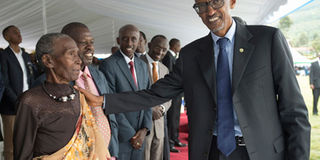Kagame to compensate Ugandans over war

President Kagame (R) talks to a Ugandan woman who contributed to the RPF/A effort to liberate Rwanda from 1991 to 1994. This was during Rwanda’s 21st liberation day celebrations in Gichumbi District on Saturday. COURTESY PHOTO
What you need to know:
Appreciation. Kagame says Rwanda is grateful for help given to RPF/A by Ugandans during the 1991-1994 Rwandan civil war.
GICHUMBI. Rwandan President Paul Kagame has said Kigali is ready to compensate Ugandans who lost lives and property during the liberation struggle that brought an end to the genocide against the Tutsi and moderate Hutu on July 4, 1994.
Speaking at Rwanda’s 21st liberation day celebrations in Gichumbi District on Saturday, President Kagame also hit out at critics of Kigali, telling them to “go mind their business.”
“In addition to rebuilding ourselves, we remember the support rendered by residents from across the border,” President Kagame said in reference to Uganda.
Gishambashayo in Gichumbi District where the celebrations were held is in northern Rwanda near the Ugandan border district of Kabale. The area provided the logistics wing of the Rwanda Patriotic Front/Army, that Mr Kagame commanded, during the Rwanda liberation struggle.
During the 1991-94 struggle that brought the current Rwandan government to power, hundreds of people in sub-counties of Kamwezi, Kamugunguzi, Maziba, Buhara and Rubaya that neighbour Rwanda abandoned their houses due to bombings by the then Hutu-led government fighting RPF rebels. Farms were also ravaged in the process.
“We have already spent about Rfw 250 million (Shs1.2b) in trying to compensate our neighbours who lost their cattle, property and lives but it is not enough. We can never do enough to repay those who helped us but our hearts are thankful,” the President said.
On July 4, 2009, during celebrations to mark the 15 anniversary of the RPF takeover of power at Amahoro Stadium in Kigali, President Museveni received the “Uruti” medal for his support to Rwanda’s liberation struggle.
President Kagame said his government has also built some houses for the victims of the struggle, restocked farms and provided medical care to the sick and vulnerable people of Kabale as a token of appreciation. “We have the will but maybe not the means. So we shall continue working on the means,” he said.
Mr Kagame then turned his guns on Rwanda’s critics who he told off. “I have heard on the news that someone sent a Liberation Day message and said ‘We hope Rwanda continues on the right development path and respect human rights’.”
“My response: ‘What do you think? Do you think those who liberated the country do not know what to use it for? Do you see me as a person who should be reminded of what to do for the people of Rwanda when I am their leader? Is there anyone who should remind me?” President Kagame asked amidst cheers from thousands of supporters.
“We do not need anybody to hold our hands, we know the way. No one has the right to hold us in contempt,” he emphasised in a speech that lasted about 40 minutes.
Earlier in the day, the president commissioned a school, health centre and market in Gishambashayo that were constructed as part of activities to mark Army Week. Doctors from the Rwanda Defence Forces also treated 17,000 Rwandans.
At the same function, Mr Milton Ngirente, a local farmer who spoke on behalf of the populace, asked President Kagame to seek another term.
“You have started many programmes such as the Gir’inka (one cow per family), which have got us out of poverty. We have developed ourselves under your leadership,” Mr Ngirente said. “You are the best leader. We can achieve more with you if you accept to take up another term.”
Kagame’s career
President Kagame served as vice president from 1994 until 2000, when he became president after being elected by government ministers and the national assembly. In 2003, Rwanda adopted a new constitution replacing a transitional one, and Kagame was re-elected as president. He won the election again in 2010. His second elective term expires in 2017. Article 101 of the Rwanda Constitution states: “The president of the republic is elected for a term of seven years, renewable only once.”




